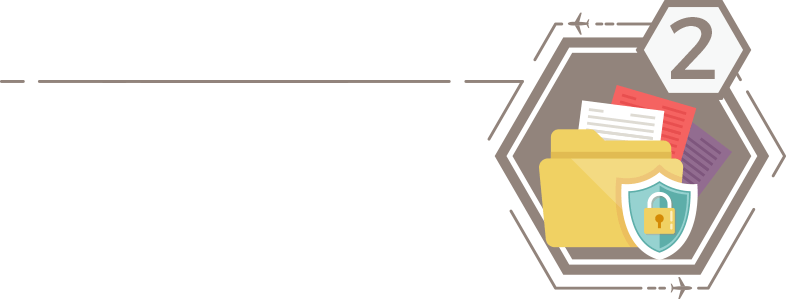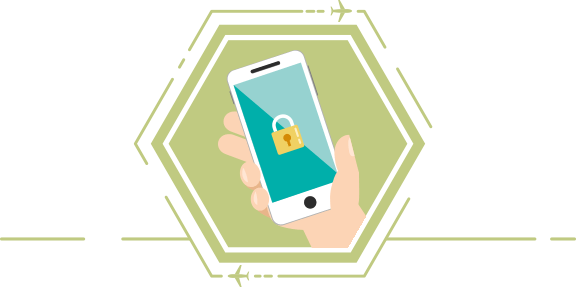A Guide to Protecting Your Information & Privacy While Traveling
Going on trips should be relaxing and fun, but as frequent flyers ourselves, we know the stress of keeping an eye on all your belongings. You must keep track of where your bags, important documents like passports, wallet and other valuables, and gadgets like phones and cameras are. But physical belongings aren’t the only things you should be worried about when traveling.
The truth is, travelers are incredibly vulnerable to identity theft and fraud. Tourists are prime targets of scams. Not to mention, connecting to an unsecured public Wi-Fi puts your digital data at risk. There are also other things – withdrawing or checking balance from questionable ATMs, using public computers to access email and other important accounts, a lost wallet containing identification, and many more. So how can you keep your digital and personal information safe while traveling?
Expert Insights
Before delving into the specifics behind how to protect your identity, personal information, and privacy while traveling, let’s get a glimpse at what some industry experts have to say.
General Tips for Protecting Your Privacy When You Travel
Phones and gadgets keep us connected while we’re away from home and the office. They are a travel essential. But at the same time, they are also a treasure trove of personal and digital information waiting to be snatched up. We’re not just talking about physical theft of a phone, though, but also theft of sensitive information in order to commit fraud.
To protect yourself from identity theft, practice the following strategies to stay connected while remaining cyber safe on your travels. Before you take off, consider these pointers:










Download a VPN and familiarize yourself with it so you can connect to public Wi-Fis with less worries while on your trip. A VPN will encrypt your traffic so that no one within the public Wi-Fi’s network can sift through your browsing activities,
DURING YOUR TRIP
While you are on vacation, consider taking the below measures to keep yourself protected on the move:








BACK HOME
Keeping yourself and your personal information secure requires regular attention. When you get back, we recommend that you:





5 Things Every Vacationer Must Protect
Make sure security is on your packing list before you head to your next destination! Travelers are big targets for identity theft because of all the information and devices they constantly carry around. Below are five things you should protect.
MOBILE DEVICES
Many data breaches happen when laptops, phones, or tablets are stolen or lost. This is called a physical breach, and the amount of information involved can be massive. Thieves may access these devices or resell them, causing even more security headaches. The good news is that there are simple ways to prevent having your devices stolen or lost during your travels:





CONFIDENTIAL PAPERS
Those traveling for work often carry many important documents and confidential papers. In fact, more than a third of U.S. vacationers in 2022 planned to touch base with work multiple times a day during their time off. Many employees use their personal devices to access corporate data such as emails, financial data, and customer records. To prevent such data from getting compromised, consider doing the following on your trip:





ID & CREDIT CARDS
Criminals often look for people’s ID cards and credit cards to assume false identities, which is why it is crucial to protect yourself from card theft. With that said,




TRAVEL DOCUMENTS
Travel itineraries, passports, car rental documents, airline tickets, and boarding passes should be kept securely. These documents contain confidential information that you won’t want a stranger stumbling across. For your safety,





INTERNET OF THINGS DEVICES (IOT)
If you use smart devices like heart pressure monitors and fitness trackers that connect to the internet to send and receive information, you may want to take extra measures to protect yourself. Bear in mind that cyber criminals may be able to access your data remotely. With that said, be sure to:



Protecting Your Identity at Home
Heading out of town requires you to not only protect your identity while you are away, but also make sure everything at home stays safe, too. Since you won’t be around to keep an eye on things, you’ll want to add these to-do’s to your checklist before leaving:


Internet Security for Travelers
When it comes to protecting your information & privacy while traveling, you can never be too safe. Perform a few precautions for peace of mind, and keep your personal information safe with these tips:
ON YOUR OWN DEVICE





ON A PUBLIC COMPUTER








Conclusion
Today’s advanced technology has helped to make a plethora of things easier, including traveling, staying in touch with friends and family, getting work done on the go, being entertained, and more. For most, having an electronic device like a cell phone, tablet, or laptop is crucial for a complete travel experience. These perks do come with drawbacks and increased risks for cyber theft and the compromise of personal information. In this guide, we have done our best to elaborate on the security measures you can take to travel safely. While our tips are not foolproof, it goes without saying that every measure taken can help to reduce the chances of identity theft. We encourage you to explore other resources to stay informed about fraud and identity theft.
Additional Resources
Below are more resources on taking precautionary actions to protect your personal information, data, and identity while you are away from home.
- National Geographic – Practical Tips for Protecting Your Data While Traveling
- Federal Trade Commission – Avoid Scams When You Travel
- McAfee – How to Keep Your Data & Devices Safe While Traveling
- Harvard University – Keeping Your Data Safe Abroad
- Business News Daily – Cybersecurity While Traveling: Tips and Tricks
- National Counterintelligence and Security Center – Traveling Overseas with Mobile Phones, Laptops, PDAs, and Other Electronic Devices












